Articles/Essays – Volume 11, No. 4
Reflections on T. Edgar Lyon
A tribute given at this funeral
T. Edgar Lyon, a healthy and rugged man who had hardly known a sick day, died at age seventy-five after a short, losing battle with cancer. In his death, his wife, six sons, and thirty-two grandchildren lost a gentle, loving husband and father, and the Church a great historian and teacher.
Brother Lyon has written courses of study for the priesthood, Relief Society and Institutes, and hundreds of articles and book reviews, but his major work—The History of Nauvoo—he left only half finished. This is an irreparable loss to scholars and the Church.
It was my privilege to be his colleague at the Institute of Religion, University of Utah, from 1939 to 1962. During the first half of this time he and I were the only faculty. We were together daily, evenings, and on Sundays. Several summers we worked together painting houses, digging out a basement, building an upstairs. With several couples, we formed a study group which has met for forty years. I could never get enough of his company. In those twenty-three years at the Institute and the sixteen which have followed not an ill-feeling or a derogatory remark has ever passed between us.
Those early years at the Institute were the “Golden days” of our youth. There was no established curriculum. We built courses around the needs and interests of students as well as on subject matter dictated by history and the nature of religion. With a remarkable group of students we laughed and danced, counseled and worshipped, taught each other, and created a fraternity—Lambda Delta Sigma—to meet their social needs and to provide leadership experience. The fraternity became our laboratory for the gospel we taught.
Ed Lyon was a real Latter-day Saint, a worthy disciple of Jesus Christ. In him was a total absence of pretense. He never sought the honors of men. He never took the chief seats. His only interest was to serve, to give of himself, to lose his life in the interest of others. I was younger than Brother Lyon and much less prepared to teach religion than he was. However, because I was appointed the first Director of the Institute, I remained in that position. Ed Lyon was not envious nor resentful as my associate director, but wholly loyal and cooperative.
Ed exemplified the Beatitudes. He was humble, teachable, receptive of criticism without offense, meek, merciful, pure of heart, a peacemaker. I never saw him angry, deceitful, hypocritical, or selfish. In my memory, he will ever remain a saint of saints.
Brother Lyon was a fascinating teacher. He had a photographic encyclopedic memory, a remarkable ability to retain even the minutest details if they were relevant. He was at his best teaching historical subjects or the Doctrine & Covenants and the New Testament which he could make rich by feeding in historical background. A most delightful part of his teaching was his ability to relate stories and experiences apropos to the subject matter. His stock of tales seemed endless.
In our study group, if we were caught without a prepared lesson, we needed only to ask Ed a provocative question and he would entertain for the evening.
His teaching was informative and substantive. Ed Lyon never fed his students pablum, nor did he, as many religious teachers do, try to build faith on the esoteric and the unfounded myths and legends which grow up in any religious movement. He built faith on solid foundations, believing that the truth could stand the light of day. Ed’s mother had been a bright, realistic woman who saw life as it really was, and her son appropriated this quality, which was strengthened by his studies at the University of Chicago and by his own integrity. T. Edgar Lyon was an honest man in whom I detected no guile.
He was also a man of deep faith. Much of this he acquired from his saintly father, Bishop David Lyon, whom he loved and admired so much. On his first mission in Holland, T. Edgar had the kind of spiritual experiences that only come to one who doesn’t seek them but is ready to receive them.
His was not a simple faith. It had stood the test of the study of comparative religion, of extensive historical study, of sound scholarship. Ed was not ignorant of the human element in our history. He knew that a people as well as individuals can err. Church history presented him with problems as well as inspiration. He had great admiration and love for Joseph Smith and for the Saints as they made 150 years of history.
T. Edgar Lyon believed in Jesus Christ and in the eternal life of man. He was as ready to meet his Maker as anyone I have ever known. Therefore, we shall not say good-bye to our dear friend, but only Auf Wiedersehen.
Ed is gone but his qualities of mind and character remain in our memory and in our lives, beckoning us to pursue them. And these same qualities bear witness to the intelligent, creative, loving God who created him. Surely a universe that can create the likes of T. Edgar Lyon has also the power to preserve him. This is my faith—which his life has strengthened.


 Back to full Issue
Back to full Issue

